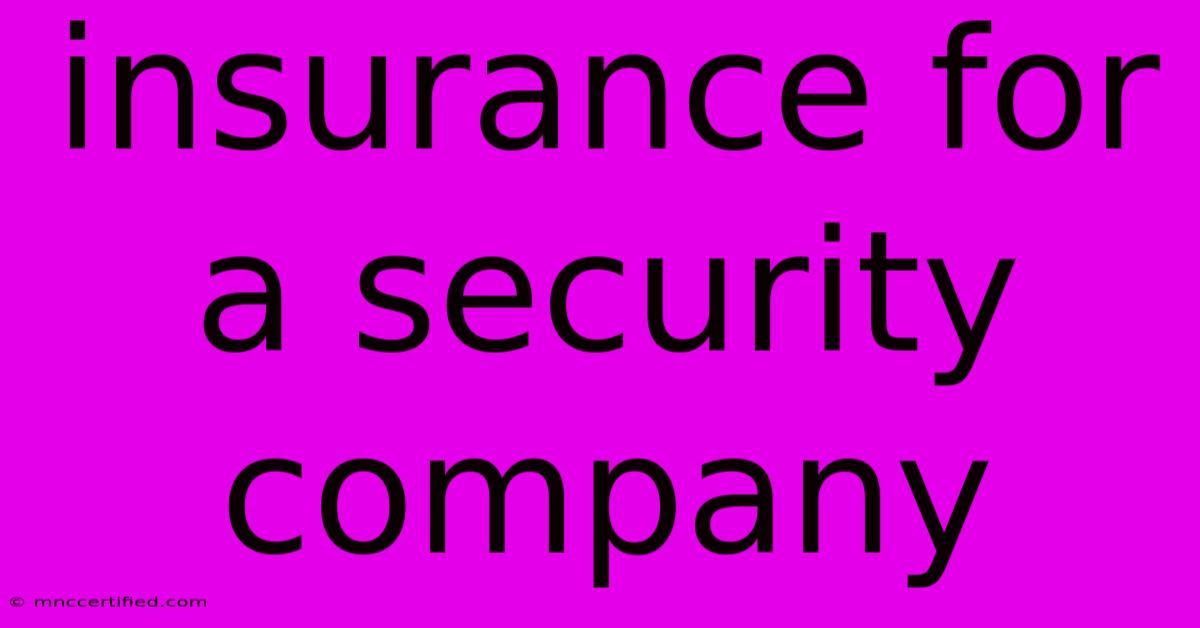Insurance For A Security Company

Table of Contents
Securing Your Security Business: A Comprehensive Guide to Insurance
The security industry is a high-stakes field. Protecting clients' assets and personnel comes with inherent risks. That's why comprehensive insurance is not just a good idea for security companies – it's a necessity. Failing to secure the right coverage could lead to devastating financial consequences in the event of an incident. This guide will explore the essential insurance types every security company should consider.
Understanding Your Risks: Why Insurance is Crucial
Before diving into specific policies, it's crucial to understand the unique risks faced by security companies. These can include:
- Liability for employee negligence: An employee's mistake, like failing to properly secure a premises, leading to theft or injury, could result in costly lawsuits.
- Damage to property: Security personnel might accidentally damage client property during their duties.
- Bodily injury: Altercations or accidents involving security guards can lead to significant medical expenses and legal battles.
- Theft or loss of equipment: The loss or damage of company-owned security equipment, such as surveillance cameras or patrol vehicles, represents a substantial financial blow.
- Professional liability (Errors & Omissions): A security company might be held liable for failing to provide the services outlined in their contract, leading to client losses.
Essential Insurance Policies for Security Companies
Security companies need a multi-layered approach to insurance. Here’s a breakdown of key policies:
1. General Liability Insurance: The Foundation
This is the bedrock of any security company's insurance portfolio. General liability insurance protects your business from claims arising from bodily injury or property damage caused by your operations or employees, regardless of fault. This covers a wide range of scenarios, from a client tripping on your equipment to a guard accidentally causing damage during an intervention.
2. Commercial Auto Insurance: Protecting Your Fleet
If your security company utilizes vehicles, commercial auto insurance is non-negotiable. This policy covers accidents, injuries, and property damage caused by your company vehicles while on duty. Ensure your policy covers all company vehicles, including those used by employees for work purposes. Consider adding uninsured/underinsured motorist coverage for added protection.
3. Workers' Compensation Insurance: Protecting Your Employees
This is a legal requirement in most jurisdictions. Workers' compensation insurance covers medical expenses and lost wages for employees injured on the job. This protects your company from costly lawsuits and ensures your employees receive the care they need.
4. Professional Liability Insurance (Errors & Omissions): Protecting Your Reputation
Also known as Errors & Omissions (E&O) insurance, this policy covers claims of negligence or mistakes in professional services. For security companies, this could include failing to prevent a security breach or providing inadequate security services, leading to financial losses for your clients. This is especially critical for larger firms providing complex security solutions.
5. Umbrella Liability Insurance: Broader Coverage
An umbrella liability policy provides additional liability coverage beyond your general liability and other policies. It acts as a safety net in the event of a significant claim that exceeds the limits of your other insurance policies, offering substantial financial protection against catastrophic events.
Choosing the Right Insurance Provider
Selecting the right insurance provider is crucial. Look for insurers specializing in the security industry, as they understand the unique risks involved. Obtain multiple quotes, comparing coverage options and premiums before making a decision. Don’t hesitate to ask questions and ensure you fully understand the terms and conditions of each policy.
Beyond Insurance: Risk Management Strategies
Insurance is a crucial component, but proactive risk management is equally important. Implementing robust security protocols, providing comprehensive training to employees, and maintaining detailed records are essential steps in mitigating risks and reducing the likelihood of claims.
By understanding the risks involved and securing the appropriate insurance coverage, security companies can protect their financial future and operate with confidence, knowing they are prepared for unforeseen events. Remember, a well-structured insurance plan is an investment in the long-term success and stability of your security business.

Thank you for visiting our website wich cover about Insurance For A Security Company. We hope the information provided has been useful to you. Feel free to contact us if you have any questions or need further assistance. See you next time and dont miss to bookmark.
Featured Posts
-
Amwins Access Insurance Services
Nov 21, 2024
-
Russia Launches Missile At Ukraine
Nov 21, 2024
-
Rhinoplasty Covered By Insurance
Nov 21, 2024
-
Cavs Celtics Preview Time Tv Injury Report
Nov 21, 2024
-
Water Bond For Above Ground Pool
Nov 21, 2024